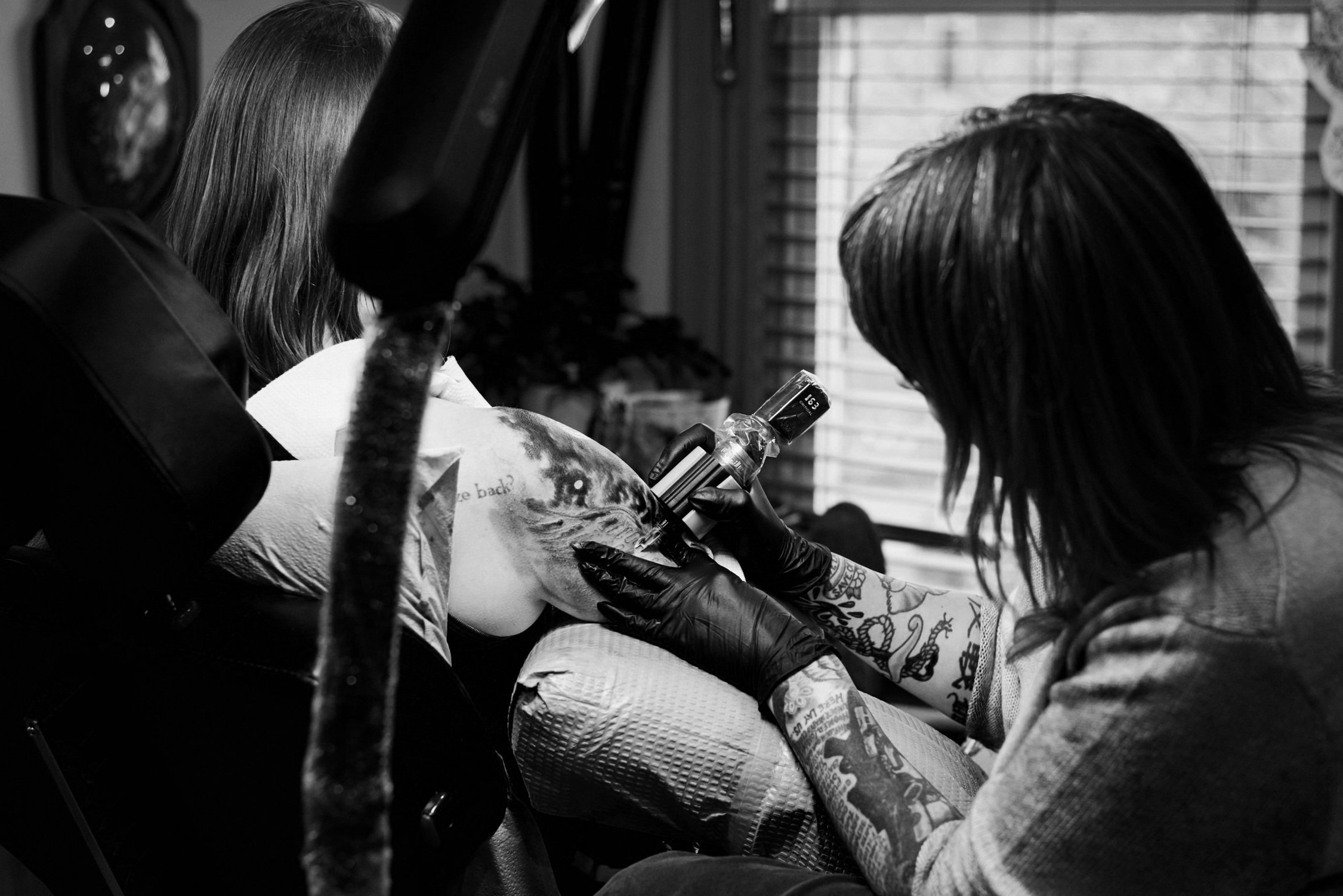
Aftercare
Aftercare is an integral part of the tattoo and piercing process that can help ensure the health and longevity of your new body art. Proper aftercare can also help prevent infections, scarring, and other complications.
It's essential to follow the aftercare instructions provided by your tattoo artist or piercer and take care of your tattoo or piercing with clean hands and a gentle touch. With the proper care, you can help your new body art heal properly and look great for years to come!
Tattoo
-
Wash your tattoo gently with unscented soap and cool water 2-3 times a day, starting a few hours after it's done.
Pat dry with a clean paper towel, then apply a small amount of unscented moisturizer.
Do not over-moisturize, and avoid using petroleum-based products like Vaseline.
-
Wear loose, clean clothing to avoid irritating the tattoo.
Avoid exposing your tattoo to direct sunlight, hot water, or bodies of water (like swimming pools) for at least two weeks.
Don't scratch or pick at your tattoo; this can damage the healing skin and cause infection.
-
Wash your hands thoroughly before touching your tattoo.
Avoid working out or sweating excessively for 48 hours after getting tattooed.
Continue to moisturize and exfoliate the skin around your tattoo, and protect it from UV rays with sunscreen once it's fully healed.
Remember, everyone's skin is different and may require slightly different care during healing. If you notice any signs of infection or other concerns, don't hesitate to contact your tattoo artist or a healthcare professional for advice.
Piercing
-
It is essential to keep the piercing clean to avoid infection. Body piercings should be cleaned twice daily during the initial healing period and once daily for the life of the piercing.
The easiest time to clean piercings is at the end of a shower. For oral piercings, use an alcohol-free mouthwash and cut it with water.
Sea salt soaks can also promote blood flow and reduce irritation.
-
Bleeding, bruising, and swelling are not uncommon and do not indicate a problem.
For oral piercings, swelling is normal during the first part of the healing period, and you can suck on ice to bring it down. Avoid oral contact for at least two weeks, and stay away from spicy foods for the first few days.
If swimming in a pool or ocean, rinse and clean the piercing at your next convenience.
-
It is essential to avoid using harsh cleaning agents like alcohol, peroxide, or Betadine, as well as ointments that prevent oxygen from getting to the piercing.
Cleaning more than two times a day can be harmful, and submerging the piercing in a lake, pond, or hot tub for at least one month.
Avoid constrictive clothing that stresses the piercing. And you should leave the jewelry in for the entire healing period.
Permanent Makeup
-
Brows: First 1 to 2 hours blot gently as needed. Morning and night wash with a mild, unscented cleanser, rinse, pat completely dry.
Lip Blush: Use a cool compress wrapped in a clean paper towel if swollen. After eating, gently cleanse and pat dry.
Lashliner: With eyes closed, lightly cleanse along the lash line morning and night. No contact lenses the day of service.
Faux Freckles: Wash with gentle cleanser morning and night, then pat dry.
-
Apply a very thin layer of the provided aftercare balm only when skin feels tight or dry. No makeup on or around the treated area.
Avoid sun, sweat, steam, pools, hot tubs, and spray tans for at least 7 days. Sleep on a clean pillowcase and avoid touching or rubbing.
Lip Blush: If you were prescribed an antiviral for cold sores, continue it for 3 days after. Choose cool drinks and bland foods for the first 24 hours.
Lashliner: No mascara or lash products for 5 to 7 days. Pause lash serums and extensions until cleared by your artist.
-
Do not pick or scratch flakes. Let them shed naturally.
No facials, peels, retinols, exfoliants, or brow lash tinting for at least 2 weeks.
Lip Blush: Avoid spicy or very hot foods and kissing for 24 to 48 hours.
Brows and Freckles: Keep hats and bangs clean and off the area.
All services: Minimize intense workouts for 3 to 5 days.
Tooth Gems
-
First 30 minutes: do not eat or drink to let the adhesive set.
For the first 12 to 24 hours: avoid brushing directly on the gem or flossing around it. Rinse gently with water if needed.
Starting day 1: brush gently with a soft-bristle toothbrush, angling away from the gem. Choose alcohol-free mouthwash.
-
For 24 to 48 hours: avoid sticky, hard, or crunchy foods near the gem, like caramels, gum, taffy, ice, nuts, and popcorn kernels.
Do not pick at the gem or push on it with your tongue or fingers. Avoid very hot drinks the first few hours.
Skip whitening strips, peroxide whiteners, charcoal or abrasive toothpaste while the gem is on. Tell your dental hygienist about the gem at cleanings.
-
We do not recommend trying to remove or re-glue the gem yourself.
Avoid smoking and alcohol mouthwash for 24 hours.
Do not do dental work or professional whitening on that tooth until the gem is professionally removed.

Tell Us How We Did
Leave us a review using the links below, we appreciate all of your feedback!
(Be sure to mention who you worked with and also share a photo.)




